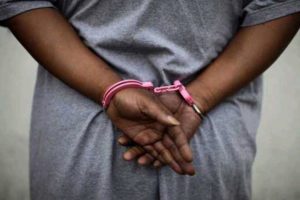
Ex-president of Nigeria, Muhammadu Buhari has been accused of not handling the insecurity issues in the country appropriately, while he was in government.
A former military governor of Old Kaduna State, Abubakar Dangiwa Umar in an interview with Sunday Sun made this claim.
According to Umar, over 80,000 persons lost their lives, while thousands of women and girls were raped under Buhari’s administration.
He further stated that hundreds of thousands were kidnapped and killed or released after the payment of ransom.
Umar added that the ex-president was more concerned about his administration’s security than national security, which explains his decision to retain military Service Chiefs in the face of public dissatisfaction with their performance.
The ex-military governor when asked during the interview if the over-stretching of our military in their fight against terrorism led to the emergence of banditry, kidnapping for ransom, farmers-herders conflict and separatist movements said, “Partially so. Even the strange decision to relocate the military’s command centre from the federal capital, the seat of the Commander-in-Chief and his Service Chiefs would point to this.
“These other security challenges existed even though they were not as virulent as the Boko Haram insurgency. But unlike past administrations, the Buhari Presidency failed to deal decisively with them, causing them to fester.
“Had he allowed the continuation of the counter-insurgency strategy, Boko Haram would have been totally defeated, making troops available for other security details.
“Unfortunately, the Boko Haram insurgency lingers on to this day. The government’s claim of having technically defeated the insurgents is empty propaganda. We are still awaiting Mr Lai Muhammad’s plan to convert Sambisa Forest into a holiday resort.
“Let’s review the most serious security challenges which were simmering as the Boko Haram insurgency was raging. We should also look at how past administrations reacted to their emergence and forestalled them morphing into the existential security threats which they have become currently.
“The Maitatsine, an ‘Islamic’ fundamentalist sect emerged in the early 1980s under the President Shehu Shagari administration. It had its base in Kano, with cells in other parts of the North, more visible in Maiduguri, Yola and Kaduna.
“Sensing its security threat, the government ordered the military to dislodge and stamp them out. Its headquarters in Kano was destroyed.
“Its cells were also exterminated. Many of its members, including its leader, Muhammad Marwa, were killed. Many were arrested and prosecuted.
“This brought to an end, the Maitatsine religious uprising. Banditry; this also became a serious security challenge in the late 1970s and early 80s. Bandits bearing sophisticated arms crossed into Nigeria from neighbouring states of Chad, Niger Republic and Cameroon.
“They rustled livestock and foodstuffs and retreated into their bases in those countries. Once again, President Shagari tasked the military to confront the threat.
“The 3 Armoured Division, Jos, under the command of General Muhammadu Buhari, was given the mission. The Division successfully drove out the bandits, pursuing them across our border into Chad, with the aim of attacking their bases and preventing them from future raids. This resulted in a diplomatic row between Nigeria and Chad.
“In an effort to placate the Chadians, the Shagari administration conveyed its disapproval to General Buhari, a kind of censure or slap on the wrist. The General was so angered by this which must have contributed to his decision to lead a coup against the government of Shehu Shagari.
“The arrest and detention of Dr. Haruna Adamu, whose magazine wrote an editorial critical of General Buhari’s actions is evidence of the General’s anger. Dr Haruna Adamu remained incarcerated and was only released after the ouster of General Buhari’s regime in August 1985.”
Umar while speaking on the issue of banditry in the country said, “The new banditry and kidnapping for ransom have assumed an industrial scale in the past eight years.
“Most of the perpetrators we have encountered were Tuaregs and Fulanis. Some of the Fulanis were herders who lost their livestock to cattle rustling. But most of the new recruits in the growing army found these criminal enterprises very lucrative and low risk.
“These criminals continued to roam freely, bearing sophisticated weapons. They have pillaged most of the rural areas in the Northwest and some parts of North-central. More than 300 villages in Zamfara State alone have been sacked.
“They have rendered over 70 per cent of the farms in these areas inaccessible. The failure of the Buhari administration to confront this metastasizing security cancer has so confounded Nigerians, causing cynics to attribute this failure to the President’s shared ethnicity with the criminals.
“If the Boko Haram insurgency appears defeated or at least under control, it is because banditry and kidnappings have eclipsed it in terms of posing greater national security challenge.
“The farmer-herders conflict; is an age-old struggle for the control of land and water resources. The conflict was easier to manage due to the abundance of these resources and the possibility of delineating grazing reserves and livestock routes.
“The sedentary farmers were quite welcoming and accommodating of the herders in a symbiotic relationship. Desert encroachment, exponential population growth and rapid expansion of arable farming have caused land and water resources to shrink, leading to the intensification of the conflict.
“The civil war raging between farmers and herders in the Middle Belt more concentrated in Plateau, Benue and Nasarawa states must be seen in this context. If it appears like as an ethno-religious conflict, it is because the herders are Muslim Fulanis and the farmers are mostly of different ethnicities and Christians. The divide-and-rule policy of opportunistic politicians has also complicated matters and led to escalation.
“States and the Federal Government must provide solutions to this crisis. They must create an enabling environment for balanced and sustainable livestock and arable farming to guarantee the much-desired food security.
“Separatist movements; have existed since amalgamation in 1914, but grew during the struggle for independence and soon after. Sections or regions which felt aggrieved or marginalised by unfavourable Federal Government policies sought relief through different means, which included threats to exit the federation.
“The Biafran secession which led to the 30 months of civil war was the most successful attempt at separation. Since then, separatist threats have been peacefully handled and discouraged.”
Umar in his take on Biafrans to break out of Nigeria, claimed that ex-President Buhari’s discriminatory and exclusionary policies against the Igbo enhanced the agitation.
He noted that Buhari while in power did not find any Igbo extraction worthy of appointment as head of any of security services.
Umar stated, “The current Biafran movement as represented by the Indigenous People of Biafra (IPOB) was given traction by ex-President Buhari’s discriminatory and exclusionary policies against the Igbo, hence the Igbo voting decision by which they gave General Buhari five per cent of their votes and, therefore, undeserving of key appointments in his government. No person of Igbo extraction was found worthy of appointment as head of any of the security services in all of President Buhari’s eight-year tenure. We must view the Nnamdi Kanu-led IPOB separatist struggle in this context.
“The young man is fighting a just cause. God forbid that we succeed in creating a nation in which citizens, particularly the youth, remain passive in the face of injustice.
“The Federal Government must obey the court’s decision and release Nnamdi Kanu. IPOB must pursue its objective peacefully.”
While rating Buhari’s administration’s fight against insecurity, the ex-military governor said, “The current violent struggle is disruptive and injurious to the nation and more so to its kinsmen. In summary, the failure of President Buhari’s administration in the area of security can be appreciated by the following statistics: Over 80,000 persons have lost their lives. Thousands of women and girls were raped.
“Hundreds of thousands were kidnapped and killed or released after the payment of ransom. Millions have been internally displaced. It would appear that the president was more concerned about his regime’s security than national security, which explains his decision to retain military Service Chiefs in the face of public dissatisfaction with their performance.
“Nigerians were amused when President Buhari was honoured with some highfalutin security award by a senile President of Mauritania.”





